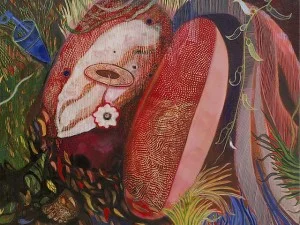Cover art from the author’s new book Seam, by Dilara Begun Jolly
—Independence Day Celebration 2011, Dhaka
i.
In a courtyard, in these stacks of chairs
before the empty stage—near are
we Lord, near and graspable. Lord,
accept these humble offerings:
stacks of biscuits wrapped in cellophane,
stacks of bone in glass: thighbone,
spine. Stacks of white saucers, porcelain
circles into which stacks of lip-worn
cups slide neat. Jawbone, Lord. Galleries
of laminated clippings declaring war.
Hands unstack chairs into rows. The dead:
they still go begging. What for, Lord?
Blunt bayonets, once sharp as wind?
Moon-pale stacks of clavicle? A hand—
ii.
Moon-pale stacks of clavicle a hand
brushes dust from. I lost a word
that was left to me: sister. The wind
severs through us—we sit, wait
for songs of nation and loss in neat
long rows below this leaf-green
flag—its red-stitched circle stains
us blood-bright blossom, stains
us river-silk—I saw you, sister, standing
in this brilliance—I saw light sawing
through a broken car window, thistling
us pink—I saw, sister, your bleeding
head, an unfurling shapla flower
petaling slow across mute water—
iii.
Petaling slow
across mute water,
bows of trawlers
skimming nets
of silver fish that ripple
through open
hands that will carve them
skin-
less. We were hands,
we scooped
the darkness empty. We
are rooted
bodies in rows silent before
the sparked
blue limbs of dancers
leafing the dark
light indigo, then
jasmine alighting
into a cup, then
hands overturning
postcards bearing flag
and flower, hands
cradling the replica of a boat,
hands
thrust there and into
nothingness. You,
a corpse, sister, bathed
jasmine, blue—
iv.
A corpse: sister, bathed jasmine. Blue,
the light leading me from this gift shop into
a gallery of gray stones: Heartgray puddles,
two mouthfuls of silence: the shadow
cast by the portrait of a raped woman trapped
in a frame, face hidden behind her own black
river of hair: photo that a solemn girl
your corpse’s age stands still and small
before. She asks, Did someone hurt her?
Did she do something bad? Her mother
does not reply. Her father turns, shudders,
as the light drinks our silences, parched—
as I too turn in light, spine-scraped—
you teach you teach your hands to sleep
v.
you teach you teach your hands to sleep
because her hands can’t hold the shape
of a shapla flower cut from its green leaf
because her hands can’t hold grief
nor light nor sister in her hands fistfuls
of her own hair on her wrists glass bangles
like the one you struggled over your hand
the same hand that slapped a sister’s wan
face look the young girl stands before
the photo of the young woman who swore
she would not become the old woman
crouched low on a jute mat holding
out to you a bangle a strange lostness was
bodily present you came near to living
vi.
Bodily present, you came near to living,
Poet, in this small blue dress still stained,
the placard states, with the blood of the child
crushed dead by a soldier’s boot. Who failed
and fails?—nights you couldn’t bear the threshed
sounds of your heart’s hard beating. I press
a button: 1971 springs forth: black and white
bodies marching in pixelated rows. Nights
you resuscitated the Word, sea-overflowed,
star-overflown. A pixelated woman tied
with a white rope to a black pole, her white
sari embroidered with mud or blood. Nights
you were the wax to seal what’s unwritten—
the screen goes white in downdrifting light.
vii.
The screen goes white. In downdrifting light,
the stairwell is a charred tunnel. We walk out
of it into the couttyard—my skirt flares a rent
into the burnt evening. Something was silent,
something went its way—something gnashes
inside me, sister—along the yellow gashes
of paint guiding me through these rooms lined
with glass cases, past machine gun chains
shaped into the word Bangla. Here, on this
stage, a dancer bows low her limbs
once more before us. The stage goes silent.
We gather ourselves: souvenirs of bone.
Pray, Lord. We are near. Near are we, Lord—
in a courtyard, in these stacks of chairs.
*This poem appears in the author’s new book, Seam, published by Southern Illinois University Press.
Tarfia Faizullah was born in Brooklyn, New York, and raised in Texas. Her parents immigrated to the United States from Bangladesh in 1978. Her book, Seam, won the Crab Orchard Series in Poetry First Book Award.


